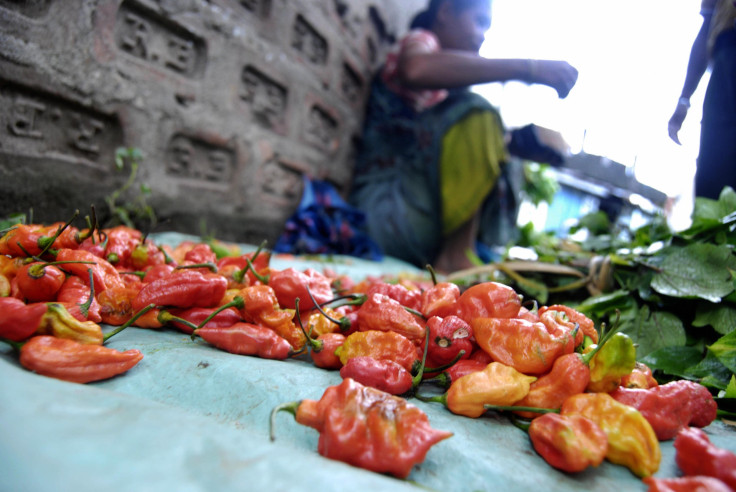Can Eating The World's Hottest Pepper Kill You? How Spicy Foods Affect The Body

The strong and sometimes overwhelming effects that come with eating spicy food are caused by one small chemical found in chili peppers: capsaicin. The discomfort of eating high amounts of capsaicin is meant to deter overconsumption, but for those able to overcome both the physical and mental pain, the consequences can range from unpleasant to just plain deadly.
The Biological Importance Of Spicy Food
Despite the pain associated with eating hot food, researchers believe that the spices used to give dishes that certain je ne sais quoi may have helped to ensure the survival of some cultures. Traveling the globe, one might notice that countries with hotter climates also serve spicier cuisine. Researchers at Cornell University found that this is no coincidence.
Heat causes food to spoil, and before the onset of electrical refrigeration this was a serious health risk in hotter climates. In their 1998 study, the team found that many spices that give food their kick also protect against the growth of foodborne bacteria and fungi. Capsaicin in particular killed or inhibited up to 75 percent of all bacteria in food, according to the press release.
What Happens If You Eat The World’s Hottest Pepper?
Although chilies are found in many dishes throughout the world, capsaicin is actually a neurotoxin and in large enough concentrations can cause seizures, heart attacks, and even death.
The hottest pepper in the world is the bhut jolokia chili pepper, also known as the ghost pepper, and according to Dr. Paul Bosland, the man who discovered it, enough of this pepper in a short period of time can surely kill you.
"A research study in 1980 calculated that 3 pounds of extreme chilies in powder form — of something like the bhut jolokia — eaten all at once could kill a 150-pound person," Bosland, told Live Science. "However, one's body would react sooner and not allow it to happen."
One does not need to necessarily eat a ghost pepper to feel capsaicin's wrath. Ruari Barratt, a freelance journalist working in the UK, knows firsthand the effects of eating too much capsaicin after a burger laced with concentrated piri piri chili sauce from India sent him to the hospital. According to Barratt, he experienced agonizing pain in his mouth only moments after his first bite of the burger, and as time passed, the pain only worsened.
“Once whatever I'd managed to swallow reached my stomach (or however far inside me it got) my legs started convulsing and my hands seized up (I presume because I was hyperventilating),” Barratt wrote in an email to Medical Daily. “My eyes were rolling back in my skull, I was extremely pale, and it was hard to talk.”
Barratt’s experience lasted a total of three hours, and although he did not walk away with any lasting damage, his pride in eating spicy food was slightly tarnished.
Mouth, Nose, and Eyes
Although you may think Thai Green Curry tastes delicious, your body views capsaicin as an overall offensive substance which needs to be immediately flushed out. As reported by Slate, it causes the body's mucous glands to go into overhaul. The result is a runny nose and watery mouth and an increase of saliva in the mouth.
Brain
Nearly immediately, as you take your first bite of a spicy dish, you will feel the sensation of heat, despite the fact you actually don’t experience an increase in temperature. The reason for this false heat sensation is capsaicin’s ability to latch onto pain receptors known as TRPV1, which are normally only activated in the presence of heat. Once the heat-sensitive receptors are triggered into activation, the nerves send messages to your brain that make you feel as though you’re too close to a source of heat, despite no actual temperature change, Slate reported.
Sweat Glands
Once the heat-sensitive pain receptors are activated, your brain believes that you are overheating and will go to great lengths to reverse this. Eventually, the body will trigger one of its best defenses against heat: perspiration. Scientific American reported that this is why many individuals will sweat more than usual when eating a spicy meal. TRPV1’s activation will also cause our capillaries to dilate, allowing the heat to reach the surface of the body where it can more easily radiate. This results in the distinct red face and hands associated with consuming a spicy meal.
Digestive System
For many, especially those not accustomed to eating spicy food, too much capsaicin in a dish can upset the digestive tract. As in the eyes, mouth, and nose, capsaicin causes the intestines to increase in mucous production.
Capsaicin can also trigger stronger intestinal contractions, all done in an effort to help get the offensive substance out as quickly as possible. And while technique does usually get the job done, it can sometimes cause the unpleasant effect of diarrhea or vomiting.
This article originally appeared in Medical Daily
Copyright Medical Daily News Service. All rights reserved.




















